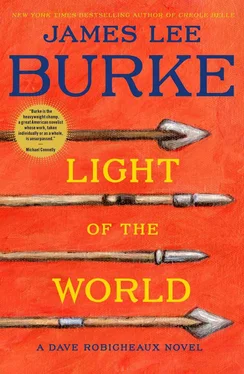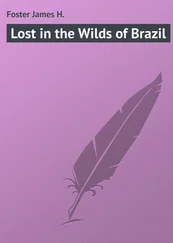The rain drummed on Albert’s fireproof roof through Wednesday night and into the early-morning hours until it quit at dawn and left the pastures pooled with water and the trees smoking with fog. When I looked out our bedroom window on the third floor, I saw an animal emerge from the woods on the north end of the property and step through the wire back fence and enter the pasture. I thought it was a coyote, one of several that came onto the property in the early hours to dig pocket gophers out of their burrows. Then I realized the color was wrong. Its fur was black, flecked with silver, its shoulders heavy, its step quick and assured, its muzzle pointed straight ahead and not at the ground. The horses in the pasture were going crazy. I realized I was looking at a wolf, perhaps the leader of a pack that had come in from the Idaho wilderness west of Albert’s ranch.
I put on my coat and half-topped boots and went downstairs and removed Albert’s scoped ’03 Springfield from his gun cabinet. I also scooped up a handful of .30–06 cartridges and dropped them in my coat pocket. Albert was drinking coffee in the kitchen, dressed in pajamas and slippers and a robe. “Where are you going with my rifle?” he said.
“There’s a wolf in the north pasture,” I said. “It’s after your horses.”
“We’ve never had wolves.”
“You do now.”
“Don’t shoot it.”
“You want to take care of it?” I said, offering him the rifle.
“I’ll be down in a minute.”
I could hear the horses whinnying and their hooves thudding on the sod and splashing through water. I went through the mudroom and out the garage door and ran toward the pedestrian gate in the north pasture. The horses were in full panic, running in circles, corkscrewing, kicking blindly behind them. The wolf was moving through the grass in a half crouch, increasing its speed, its jaw hanging loose. I pressed five rounds into the Springfield’s magazine and locked down the bolt. Inside the gate, I passed the barn and, on the far side, saw the wolf splash through a pool of water, drops of mud splattering its muzzle and forequarters. I twisted my left arm through the leather sling on the rifle and threw the stock to my shoulder and swung the crosshairs of the telescopic sight on the wolf’s rib cage.
The wolf seemed to sense that a new factor had entered the equation. I saw it look directly at me, its nose black and wet and filled with tiny lines, the nostrils dilating. I moved the sight four feet in front of the wolf and squeezed off a round. Fire jumped from the muzzle, and the loud carrack echoed off the hillsides. I saw a jet of mud and water fly in the air.
The wolf went back under the fence, the wire twanging on the steel stakes, a fence clip popping loose. I thought the wolf would keep moving, but I was mistaken. It went up the slope and disappeared behind a boulder, then reappeared next to a cedar tree and stared at me. I put the sight right on its face. There was a gray scar below one eye and another scar on its chest. On the front right paw was an area almost entirely clean of fur, as though the animal had stripped off its skin in a trap.
I ejected the spent cartridge and pushed another forward in the chamber and locked down the bolt. I moved the crosshairs to the base of the boulder and fired. The round was a soft-nose, and it flattened into the rock and powdered the air with a dirty mix of lichen and rock dust.
The wolf bounded through the trees and up the hill. I worked the bolt again and fired one more round for good measure and heard it strike a hard surface and whine across an arroyo with a diminishing sound like the tremolo in a banjo string.
“Did you hurt it?” Albert said behind me. He had pulled his trousers on over his pajamas and was wearing rubber boots and a flop-brim Australian hat.
“No. I didn’t try to.”
“I’m glad. They’re protected, unless you or your livestock are in danger.”
“Your livestock are in danger.”
“I’m glad you didn’t shoot it, regardless. Come inside and have some coffee.”
“You never had trouble with wolves?”
“No. It’s probably operating by itself. I doubt it’ll come back.”
“In my opinion, that’s wishful thinking. That wolf is not afraid. He knows there’s food here.”
“It’s nature’s way.”
“If that wolf had its way, it would have grabbed one of your horses by its face, pulled it down on the ground, and ripped out its throat.”
“I guess that’s possible.”
This is not a rational discussion. Don’t say anything else, I told myself.
The creek bed in the pasture was swollen with rainwater and running brown and fast over the banks in the grass, the cottonwoods dripping, the clouds of fog in the fir and pine trees so white and thick that we couldn’t see the tops of the hills.
“I wish you hadn’t shot toward the end of the pasture, Dave,” Albert said. “There’s a house inside that box canyon.”
“I know where it is. My angle was such that even if the bullet ricocheted, it would have gone into the hillside. I exposed no one to risk when I took those shots.”
“Let’s not talk about it anymore.”
“You want me to walk down there and knock on the door? I’d be happy to do that.”
“I said forget it. I’m sure they’re fine.”
Albert really knew how to plant the harpoon. “Who lives there?” I asked.
“A part-time preacher and his wife and two teenage daughters,” he replied. “I’ll talk to them later, in case they wonder why we were shooting down here.”
I ejected the spent cartridge from the chamber into the mud, and the rounds from the magazine, and did not bother to pick up the unfired rounds. I think I stepped on them and pressed them into the mud. I closed the bolt and handed Albert his rifle. “The next time I try to save your horses from a predator, please reload this and shoot me, and after you’ve shot me, please shoot yourself. The world will be better off all the way around.”
“What set you off?” he asked.
Clete had made a lifetime practice of not arguing with fate. He had also accepted the harsh reality that most experience, whether good or bad, comes at a price. Was a hangover worth the experience of the previous night? Rarely if ever, he would probably reply, though he repeated the same behavior over and over. Was falling in love worth the cost? He didn’t have to dwell on the answer to that one. Life had no value if it didn’t contain love.
Was there any worse fate than not loving another and not being loved in turn? If the color gray could be applied to an emotional condition, it was a life without affection or human warmth. The absence of love ensured depression, resentment of self, feelings of guilt and fear and hostility, and an inexplicable sense of personal failure that tainted every relationship and social situation. If you wished to destroy a person, at least in Clete’s opinion, you only needed to teach him that he was not acceptable in the eyes of God or his fellow man.
These were the lessons he had to learn as a child in order to survive. He didn’t talk about the dues he’d paid, and he considered self-pity the bane of the human race. The downside of his stoicism was the emotional isolation it imposed upon him.
On Thursday morning Clete arranged to meet Felicity Louviere in downtown Missoula. He thought they would visit a fly and tackle shop or perhaps investigate the antique and secondhand stores by the railroad tracks, or just enjoy the weather, the way other couples did. And that was what they did, under a blue sunlit sky that seemed to stretch infinitely over the horizon. At noon they ended up at a grocery store and deli that had been open since the late nineteenth century. They ordered salads and cold drinks and sandwiches bulging with sliced meat and cheese and lettuce and tomatoes, and found a table outside, under the canvas awning flapping in the breeze. The lampposts were hung with ventilated steel baskets that overflowed with petunias; bicyclists in spandex togs powered through the traffic; the mountains and hills surrounding the town were green from the spring rains, the air as pure and clean as wind blowing off a glacier.
Читать дальше












